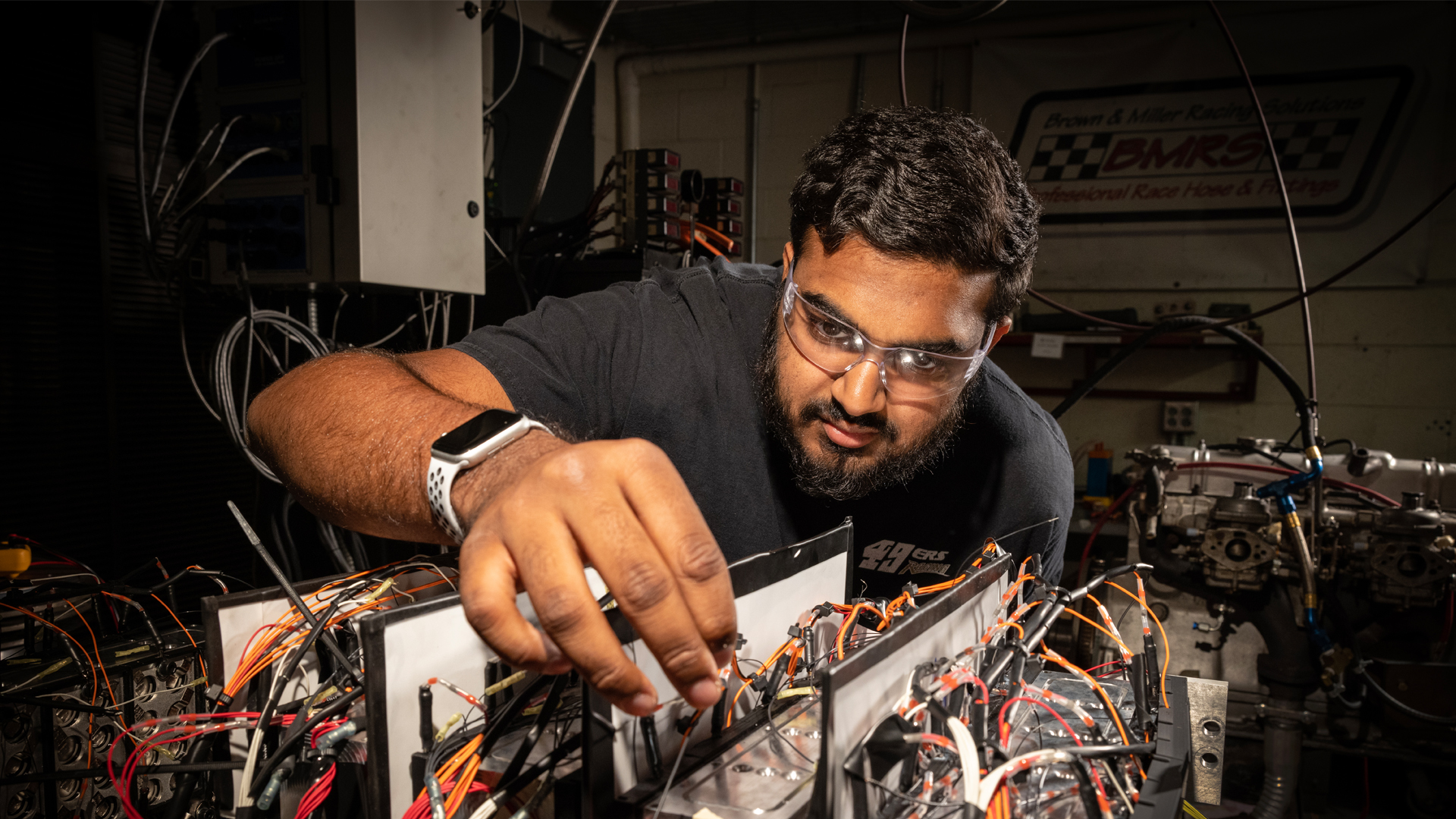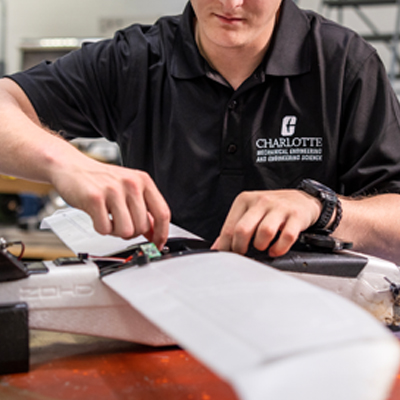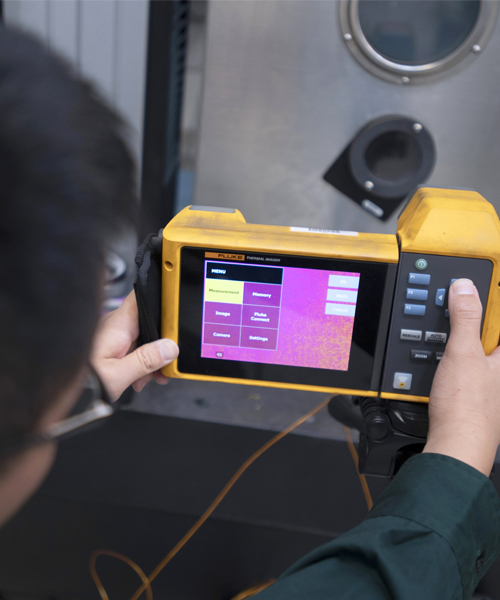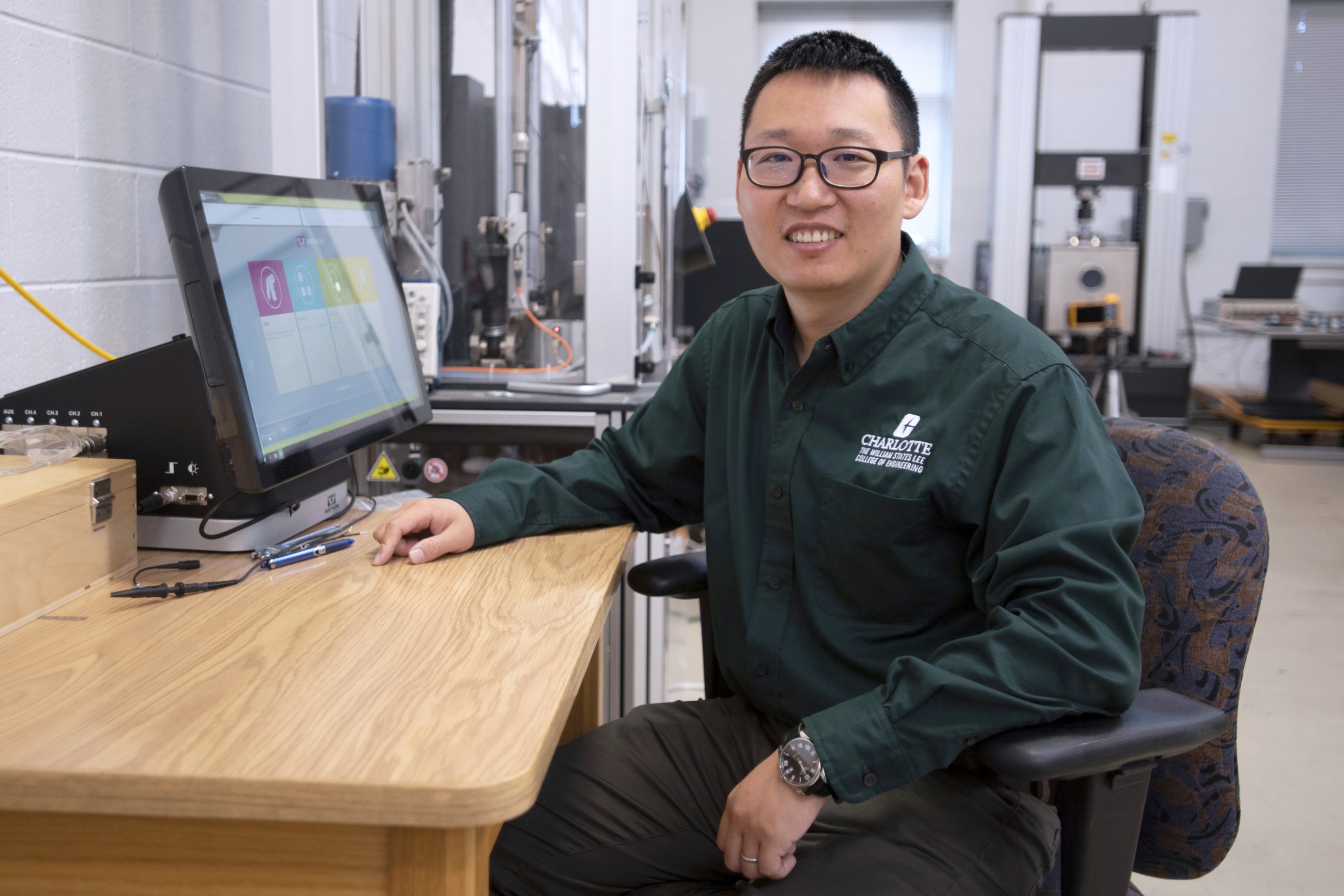BATT CAVE: Q&A
The Push to EV and Battery Research Prominence
BATT CAVE: Q&A
The Push to EV and Battery Research ProminenceBy Susan Messina
BATT CAVE— the North Carolina Battery Complexity, Autonomous Vehicle and Electrification Research Center — is the only university-led battery research center in the state.
Through this forward-looking center, a team of expert faculty and graduate students are expanding focus on the energy that is driving the future. Their innovative energy research and academic, government and industry collaborations are fueling North Carolina’s ascent as a hub for electric vehicle and battery production — as well as finding solutions to the questions surrounding the safety, durability, manufacturing and vehicle integration of next-generation batteries to support vehicles, smart cities and intelligent systems.
The following Q&A outlines the work that the William States Lee College of Engineering William States Lee College of Engineering is leading in this exciting field.
By Susan Messina
BATT CAVE— the North Carolina Battery Complexity, Autonomous Vehicle and Electrification Research Center — is the only university-led battery research center in the state.
Through this forward-looking center, a team of expert faculty and graduate students are expanding focus on the energy that is driving the future. Their innovative energy research and academic, government and industry collaborations are fueling North Carolina’s ascent as a hub for electric vehicle and battery production — as well as finding solutions to the questions surrounding the safety, durability, manufacturing and vehicle integration of next-generation batteries to support vehicles, smart cities and intelligent systems.
The following Q&A outlines the work that the William States Lee College of Engineering William States Lee College of Engineering is leading in this exciting field.
BATT CAVE founding director Jun Xu offers an inside look at Charlotte’s BATT CAVE
Describe the market need BATT CAVE is addressing. What opportunities does this environment present?
Xu: As part of a transition to clean-energy economy and key to the competitiveness of the U.S. automotive industry, battery development and production are strategically important for the U.S. economy. In this environment, North Carolina is becoming an important location for the battery and electric vehicle industry — as evidenced by Toyota’s $1.29 billion North America battery plant, Vinfast’s $2.4 billion investment for its first U.S. electric vehicle factory, and the decision by Albemarle Corporation, a global leader in pioneering lithium use, to build a new R&D center within five minutes of Charlotte’s main campus.
In addition, trending e-mobility has been asking for vehicles to act intelligently, efficiently, safely and in a user-friendly way. Autonomous and connected vehicles are among the first priorities of current vehicle original equipment manufacturers. Such sizable EV-related industry investment places a strong demand for a qualified workforce — now and even more so in the future. UNC Charlotte — with robust research capabilities and rigorous engineering programs — has an opportunity and is positioned perfectly to further strengthen, grow and contribute meaningfully to the city’s, state’s and region’s workforce and economy.


BATT CAVE founding director Jun Xu offers an inside look at Charlotte’s BATT CAVE
Describe the market need BATT CAVE is addressing. What opportunities does this environment present?
Xu: As part of a transition to clean-energy economy and key to the competitiveness of the U.S. automotive industry, battery development and production are strategically important for the U.S. economy. In this environment, North Carolina is becoming an important location for the battery and electric vehicle industry — as evidenced by Toyota’s $1.29 billion North America battery plant, Vinfast’s $2.4 billion investment for its first U.S. electric vehicle factory, and the decision by Albemarle Corporation, a global leader in pioneering lithium use, to build a new R&D center within five minutes of Charlotte’s main campus.
In addition, trending e-mobility has been asking for vehicles to act intelligently, efficiently, safely and in a user-friendly way. Autonomous and connected vehicles are among the first priorities of current vehicle original equipment manufacturers. Such sizable EV-related industry investment places a strong demand for a qualified workforce — now and even more so in the future. UNC Charlotte — with robust research capabilities and rigorous engineering programs — has an opportunity and is positioned perfectly to further strengthen, grow and contribute meaningfully to the city’s, state’s and region’s workforce and economy.


In what ways is BATT CAVE research supported and recognized as essential to the future of the growing battery and related industries?
Xu: The W.S. Lee College of Engineering has emerged as essential to EV and battery-related research activities. Major federal agencies, including the National Science Foundation, Department of Energy, Department of Defense, North Carolina Department of Transportation as well as original equipment manufacturers, chemical material providers, battery manufacturers, engineering software companies and insurance companies are sponsoring highly visible BATT CAVE research activities.
How does UNC Charlotte — from geographic, transportation and economic perspectives — factor into the equation for productive industry partnerships?
Xu: The key component for lithium-ion batteries is lithium raw materials. Within an hour’s drive are two large lithium raw material companies (Albemarle Corporation and Livent). The fast expansion of their businesses and strong connections with the battery industry have prompted collaborations with and support from local research universities, providing momentum for BATT CAVE in terms of research support.
In what ways is BATT CAVE research supported and recognized as essential to the future of the growing battery and related industries?
Xu: The W.S. Lee College of Engineering has emerged as essential to EV and battery-related research activities. Major federal agencies, including the National Science Foundation, Department of Energy, Department of Defense, North Carolina Department of Transportation as well as original equipment manufacturers, chemical material providers, battery manufacturers, engineering software companies and insurance companies are sponsoring highly visible BATT CAVE research activities.
How does UNC Charlotte — from geographic, transportation and economic perspectives — factor into the equation for productive industry partnerships?
Xu: The key component for lithium-ion batteries is lithium raw materials. Within an hour’s drive are two large lithium raw material companies (Albemarle Corporation and Livent). The fast expansion of their businesses and strong connections with the battery industry have prompted collaborations with and support from local research universities, providing momentum for BATT CAVE in terms of research support.
What are some examples of research underway at Charlotte that are making a difference to the field and to the region?
Xu: Research related to battery safety, modeling, material synthesis and electrochemistry funded by government agencies such as the National Science Foundation, U.S. Department of Energy, U.S. Department of Defense and North Carolina Department of Transportation and leading industry companies is providing new knowledge and design guidance for a variety of industries, including OEMs, battery manufacturers, suppliers, insurance companies and consultants.
NCDOT is supporting defense-related research with marine robotics for military applications, which will have national security implications. And defense-funded support is helping us inform next-generation applications for drone deliveries in population-dense locations, to name just a few examples. In regard to energy more broadly, research at UNC Charlotte is leading to groundbreaking developments such as universal charging stations for electric vehicles using curbside light poles in partnership with Duke Energy and wireless train charging, both which are first-in-the-U.S. applications.

What does all this mean for undergraduate and graduate students? What will they gain by choosing UNC Charlotte?
Xu: UNC Charlotte is the only university in North Carolina that offers an energy concentration for all undergraduate engineering majors, including mechanical engineering, where battery research is centered. Also, a battery engineering concentration will soon be an option in the M.S. in Mechanical Engineering and Engineering Science program; we anticipate a 2024 launch with a gradual expansion to the undergraduate and Ph.D. levels. Overall, curricula are designed to prepare students for industry-specific careers that are quickly becoming essential to the region’s economy. Hands-on learning, unique research opportunities and accessible internships with industry leaders, national laboratories and government agencies translate to early career success and competitive salaries.
Note: On Sept. 1, 2023, Tiefu Zhao, associate professor of electrical and computer engineering in the William States Lee College of Engineering, was named BATT CAVE’s interim director upon the departure of founding director Jun Xu from UNC Charlotte. A search for a permanent director is underway.
Susan Messina is director of strategic content for University Communications.
What are some examples of research underway at Charlotte that are making a difference to the field and to the region?
Xu: Research related to battery safety, modeling, material synthesis and electrochemistry funded by government agencies such as the National Science Foundation, U.S. Department of Energy, U.S. Department of Defense and North Carolina Department of Transportation and leading industry companies is providing new knowledge and design guidance for a variety of industries, including OEMs, battery manufacturers, suppliers, insurance companies and consultants.
NCDOT is supporting defense-related research with marine robotics for military applications, which will have national security implications. And defense-funded support is helping us inform next-generation applications for drone deliveries in population-dense locations, to name just a few examples. In regard to energy more broadly, research at UNC Charlotte is leading to groundbreaking developments such as universal charging stations for electric vehicles using curbside light poles in partnership with Duke Energy and wireless train charging, both which are first-in-the-U.S. applications.

What does all this mean for undergraduate and graduate students? What will they gain by choosing UNC Charlotte?
Xu: UNC Charlotte is the only university in North Carolina that offers an energy concentration for all undergraduate engineering majors, including mechanical engineering, where battery research is centered. Also, a battery engineering concentration will soon be an option in the M.S. in Mechanical Engineering and Engineering Science program; we anticipate a 2024 launch with a gradual expansion to the undergraduate and Ph.D. levels. Overall, curricula are designed to prepare students for industry-specific careers that are quickly becoming essential to the region’s economy. Hands-on learning, unique research opportunities and accessible internships with industry leaders, national laboratories and government agencies translate to early career success and competitive salaries.
Note: On Sept. 1, 2023, Tiefu Zhao, associate professor of electrical and computer engineering in the William States Lee College of Engineering, was named BATT CAVE’s interim director upon the departure of founding director Jun Xu from UNC Charlotte. A search for a permanent director is underway.
Susan Messina is director of strategic content for University Communications.

